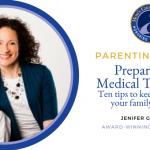 Jenifer Gershman
Jenifer Gershman
Mom’s Choice Award-winning author
Website
At the age of 38, I was unexpectedly diagnosed with a rare, life-threatening disease called amyloidosis, a blood protein disorder that was attacking my kidneys and without treatment would eventually lead to organ failure. Prior to this moment, I had been active and healthy, a former personal trainer who enjoyed exercise and eating healthfully. My son, Jason, was only four years old, waiting for me to pick him up at preschool.
 I was told I would need to be treated with high-dose chemotherapy and a bone marrow transplant. Worst of all, this aggressive treatment would wipe out my immune system, and require me to leave my home and son for 4-8 weeks in order to live within minutes of the hospital. I knew I needed to prepare Jason not only for the significant changes in my physical appearance and abilities he would surely notice, but also for this extended separation. I figured the best way to do this would be to find an age-appropriate book to read with him. There were books on potty training, going to the doctor/dentist, the first day of school, adoption, sexuality, grief, even disability. I assumed there had to be a book that helped small children to cope when a parent was seriously ill.
I was told I would need to be treated with high-dose chemotherapy and a bone marrow transplant. Worst of all, this aggressive treatment would wipe out my immune system, and require me to leave my home and son for 4-8 weeks in order to live within minutes of the hospital. I knew I needed to prepare Jason not only for the significant changes in my physical appearance and abilities he would surely notice, but also for this extended separation. I figured the best way to do this would be to find an age-appropriate book to read with him. There were books on potty training, going to the doctor/dentist, the first day of school, adoption, sexuality, grief, even disability. I assumed there had to be a book that helped small children to cope when a parent was seriously ill.
After looking in the school and town libraries, and local bookstores, I found several lovely books for families coping with cancer, but I kept searching for a book that would be appropriate for a child whose parent was facing any major illness, not just cancer. I came up empty-handed.
Without a picture book to help me, I struggled with how I would break this news to Jason; he was so young. I didn’t want to scare him or cause him to be overly worried about me, but I also wanted to tell the truth. My husband and I recognized that open communication was the foundation for the close family relationship we so valued, and this was an opportunity for us to model the behavior we hoped to instill in Jason.
 After much deliberation, I decided on a middle ground: I made up a simple, yet optimistic story to tell my son the truth. Jason was going through a real “superhero” phase, so I compared myself to a weakened superhero. In the same way Superman loses his superpowers around Kryptonite, I used this analogy to explain how the treatment would diminish my own “powers” and change my appearance.
After much deliberation, I decided on a middle ground: I made up a simple, yet optimistic story to tell my son the truth. Jason was going through a real “superhero” phase, so I compared myself to a weakened superhero. In the same way Superman loses his superpowers around Kryptonite, I used this analogy to explain how the treatment would diminish my own “powers” and change my appearance.
The decision whether or not to tell a child about a family illness is a deeply personal one. Every situation is different. Some children are simply too young to comprehend the information. However, if you are facing a similar situation, here are some of the principles I used when talking to my own son:
1.) Enable: Start promoting independence before your medical treatment so that your child is able to do more tasks on his or her own while you are recovering.
2.) Explain: Reassure your child that he is safe and cannot “catch” your illness. I emphasized these were “grown up germs” that were not contagious. Because kids know that germs spread, you may also want to clarify that you didn’t “catch” your illness from your child.
3.) Educate: I drew a smiley face for the healthy cells in my body, and a sad smiley face for the bad cells, which were making me sick. Kids respond well to pictures, use any visual aids you like. We discussed the importance of hand-washing and using hand-sanitizer, and practiced sneezing into our elbows!
4.) Enroll: Give your child a job or responsibility, so that she has an increased sense of control and feels like a valued member of your health care “team.” Perhaps she can water plants, draw pictures for the doctors and nurses, or cross days off the calendar until your treatment is over.
5.) Ensure predictability: Change as little as possible in their regular schedule, and strive to keep a normal routine when it comes to discipline, bedtime, and activities. Maintaining this structure helps kids to feel safe and secure.
6.) Emotions: Expect changes in feelings and behavior and allow children to express sadness, worry, fear, even anger. You may choose to share your situation with their teachers and caregivers so that they can offer extra support to your child.
7.) Encourage questions: Jason had lots of them along the way! Sometimes I would write them down, get answers from the doctors and nurses, and report back. Maintaining this dialogue helped him understand what was going on.
My little “story” went over very well with Jason. During the month I was away, we spoke on the phone daily and I would assure him that the doctors and nurses were taking very good care of me. When I returned home, I explained that my weakness and susceptibility to germs and bacteria was a result of my diminished “superpowers,” which would gradually return.
Keeping a sense of humor seemed to ease the tension and we found many opportunities to have fun and be a little silly – trying on my wig, rubbing my fuzzy scalp, and tucking me into bed before his bedtime.
Six months later I learned I’d have to have a second bone marrow transplant, and it was during this time I decided to write “the book I could not find” for other families struggling with a major health crisis while raising small children. I wanted to create a unique story that would engage a child’s interest, uplift a family’s spirit, and make this conversation easier and less scary. Where Did Mommy’s Superpowers Go? is not disease-specific, and is appropriate for any family facing this challenge, whether the diagnosis is cancer, or any other lesser-known illness.
In the end, I’m glad that I was so open with Jason, and able to find a positive and upbeat way to share this delicate information. Having peace of mind allowed me to focus my energy on healing and recovery, which was ultimately my primary goal. Whatever you and your family choose to do, you want to feel as if a weight has been lifted. Follow your heart and do whatever will give you the greatest sense of peace and calm, and allow you to enter treatment head on, ready to fight. Just like a REAL superhero.
 About Jenifer Gershman
About Jenifer Gershman
Jenifer Gershman is the author of Where Did Mommy’s Superpowers Go? Helping Kids Understand a Parent’s Serious Illness, for which she earned a silver Mom’s Choice Award. Based on Jenifer’s own personal experience, this heartwarming picture book is a positive and upbeat resource for any family struggling with a critical health crisis while raising young children. For more information about Jenifer and the creation of this book, please visit her blog. You can buy a copy of the book by clicking here.
View all posts by Jenifer Gershman here.
This post was originally post on the now-defunct Mom’s Choice Matters blog on Oct 6, 2011.






2 Comments on “Telling Your Child About a Serious Illness: Advice from a Mom Who’s Been There”
This is such a wonderful post !
I feel your pain,I was diagnosed at 26 with MS and it really rocked my World.